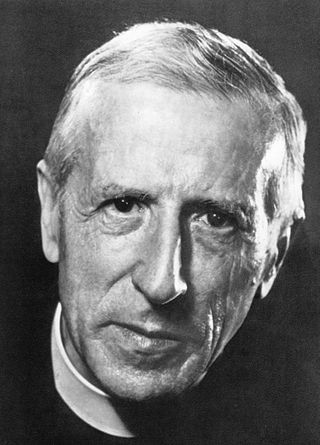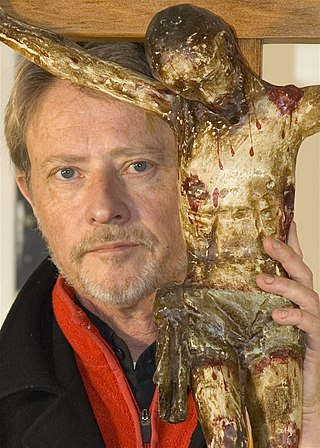The noosphere is a philosophical concept developed and popularized by the biogeochemist Vladimir Vernadsky and philosopher and Jesuit priest Pierre Teilhard de Chardin. Vernadsky defined the noosphere as the new state of the biosphere, and described it as the planetary "sphere of reason". The noosphere represents the highest stage of biospheric development, that of humankind's rational activities.

Pierre Teilhard de Chardin was a French Jesuit, Catholic priest, scientist, paleontologist, theologian, philosopher, and teacher. He was Darwinian and progressive in outlook and the author of several influential theological and philosophical books. His mainstream scientific achievements included taking part in the discovery of Peking Man. His more speculative ideas, sometimes criticized as pseudoscientific, have included a vitalist conception of the Omega Point and the development along with Vladimir Vernadsky of the concept of a noosphere.
The Omega Point is a theorized future event in which the entirety of the universe spirals toward a final point of unification. The term was invented by the French Jesuit Catholic priest Pierre Teilhard de Chardin (1881–1955). Teilhard argued that the Omega Point resembles the Christian Logos, namely Christ, who draws all things into himself, who in the words of the Nicene Creed, is "God from God", "Light from Light", "True God from True God", and "through him all things were made". In the Book of Revelation, Christ describes himself three times as "the Alpha and the Omega, the beginning and the end". Several decades after Teilhard's death, the idea of the Omega Point was expanded upon in the writings of John David Garcia (1971), Paolo Soleri (1981), Frank Tipler (1994), and David Deutsch (1997).
Spiritual evolution, also called higher evolution, is the idea that the mind or spirit, in analogy to biological evolution, collectively evolves from a simple form dominated by nature, to a higher form dominated by the spiritual or divine. It is differentiated from the "lower" or biological evolution.

Henri-Marie Joseph Sonier de Lubac, better known as Henri de Lubac, was a French Jesuit priest and cardinal who is considered one of the most influential theologians of the 20th century. His writings and doctrinal research played a key role in shaping the Second Vatican Council.

Joseph Augustine Fitzmyer was an American Catholic priest and scholar who taught at several American and British universities. He was a member of the Society of Jesus (Jesuits).
Lucile Swan was an American sculptor and artist.

Thomas Berry, CP was a Catholic priest, cultural historian, and scholar of the world's religions, especially Asian traditions. Later, as he studied Earth history and evolution, he called himself a "geologian".

John F. Haught is an American theologian. He is a Distinguished Research Professor at Georgetown University. He specializes in Roman Catholic systematic theology, with a particular interest in issues pertaining to physical cosmology, evolutionary biology, geology, and Christianity.
Fr. Robert Faricy, S.J. was a Jesuit priest and theologian who was an Emeritus Professor of Spirituality and lived in Milwaukee, Wisconsin. He was an Emeritus Professor of Spirituality at the Pontifical Gregorian University in Rome.

The Phenomenon of Man is an essay by the French geologist, paleontologist, philosopher, and Jesuit priest Pierre Teilhard de Chardin. In this work, Teilhard describes evolution as a process that leads to increasing complexity, culminating in the unification of consciousness. The text was written in the 1930s, but it achieved publication only posthumously, in 1955.
Michael William Higgins is a Canadian academic and writer. He was the interim principal of St. Mark's College and president of Corpus Christi College from July 15, 2020- July 31, 2023. Higgins and his wife Krystyna, a professional piano accompanist, liturgical musician and freelance editor, have four adult children---Rebecca, Andrew, Sarah and Alexa.
Thomas Peter Rausch is the T. Marie Chilton Professor of Catholic Theology and professor of theological studies at Loyola Marymount University in Los Angeles, having received his doctorate from Duke University.
Joseph A. Bracken, S.J. was an American philosopher and Catholic theologian. Bracken was a proponent of process philosophy and process theology of Alfred North Whitehead and Charles Hartshorne. Much of his work is devoted to a synthesis of revealed religion and Christian trinitarian doctrines with a revised process theology. Bracken introduced a field theoretic approach to process metaphysics.

William Hart McNichols is an American Catholic priest and artist from the United States. he was formerly a member of the Society of Jesus.

Steven P. Millies is an author and political theorist, and currently professor of public theology and director of The Bernardin Center at Catholic Theological Union in Chicago, IL. Before joining CTU in 2017, Millies held the Strom Thurmond Endowed Chair in Political Science at the University of South Carolina Aiken where he taught from 2003-2017.
Ursula King is a German theologian and scholar of religion, who specialises in gender and religion, feminist theology, and Pierre Teilhard de Chardin.
Andrew Joseph Christiansen was an American Jesuit priest and author. He was Distinguished Professor of Ethics and Human Development at the Georgetown University Walsh School of Foreign Service, a senior fellow at the Berkley Center for Religion, Peace, and World Affairs, and the former editor-in-chief of the Jesuit magazine America. His areas of research included nuclear disarmament, nonviolence and just peacemaking, Catholic social teaching, and ecumenical public advocacy.

Ilia Delio is a Franciscan sister of Washington, DC, theologian, author, and university professor. She holds the Josephine C. Connelly Endowed Chair of Theology at Villanova University. Delio is the founder of the Center for Christogenesis, an online educational resource for promoting the vision of Teilhard de Chardin and the integration of science and religion.









